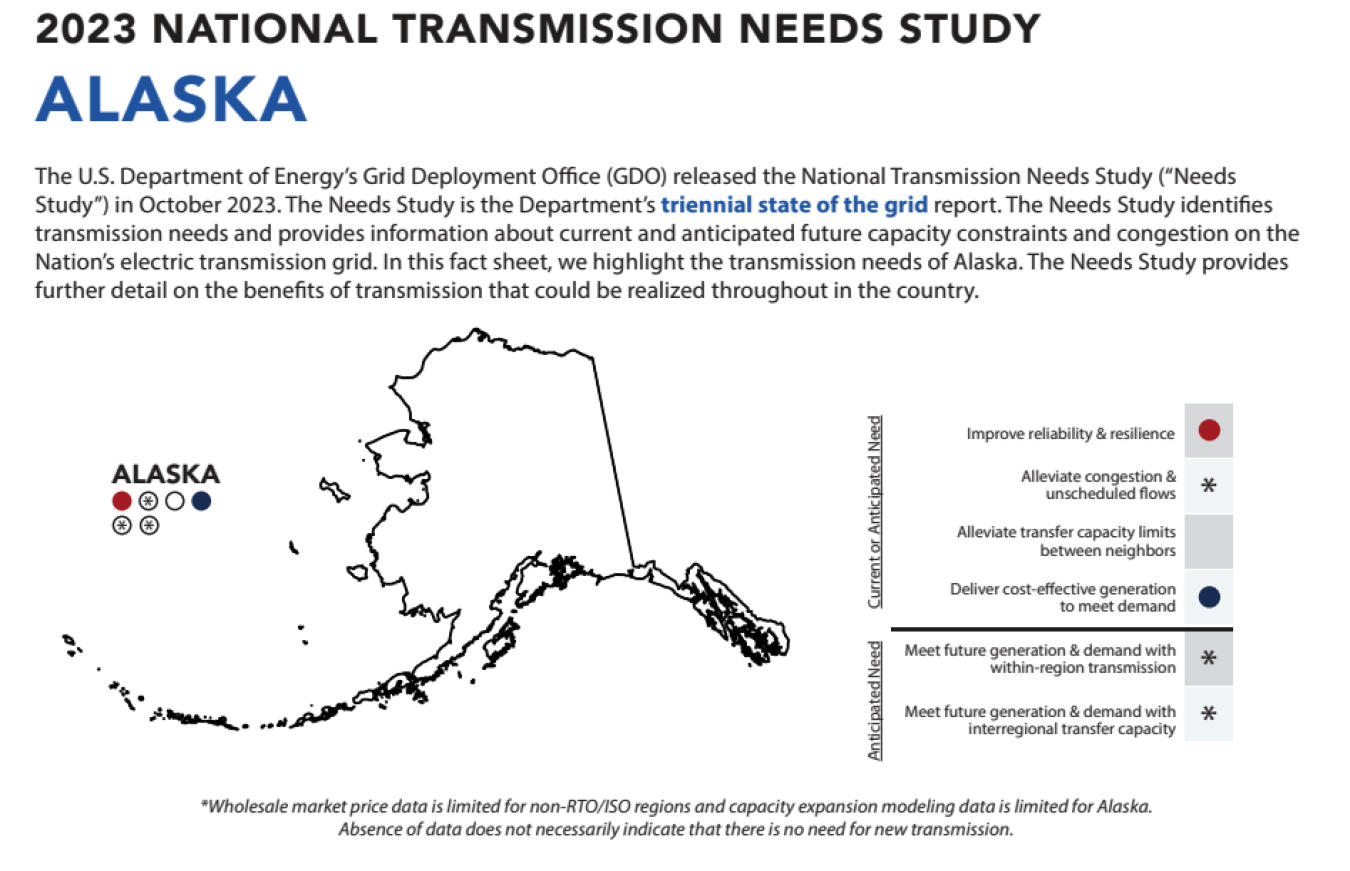The Arctic Energy Office worked to ensure that we supported the Arctic data gathering efforts for the recently released DOE National Transmission Needs Study.
November 17, 2023Transmission needs are unique and varied in our Arctic state of Alaska, reflecting its vast size and small dispersed population. That’s why it was important to the Arctic Energy Office to ensure that we supported the Arctic data gathering efforts for the recently released DOE National Transmission Needs Study, alongside other Arctic partners.
This Study, released on October 20, 2023, is an assessment of existing data and current and near-term future transmission needs through 2040. The National Transmission Needs Study (Needs Study) is critical for our agency and Nation as the challenges facing the energy system in America are continually evolving.
The U.S. is currently facing an aging grid and infrastructure that needs to be prepared and resilient in the face of extreme weather conditions and cyber security challenges, alongside ensuring adequate pathways to integrate new clean energy sources and growing transportation and building electrification. As our colleagues in the Grid Deployment Office have said, the power grid is the backbone of the nation’s electricity system, and it must adapt to maintain reliability and resiliency.
The Arctic Energy Office was happy to support the research and insight needs for advising on Alaska’s equities in this Needs Study. DOE has shown its support for addressing some of these needs through the recent Grid Resilience and Innovative Partnership (GRIP) Projects award to Alaska's Railbelt electric grid, funding $206,500,000 to the Alaska Energy Authority to facilitate a project between the State of Alaska, four Railbelt Regional Electric Cooperatives, a Railbelt municipal utility, the Regulatory Commission of Alaska, and local labor unions. Read more about this project in the award fact sheet here.
Appendix A of the Needs Study includes 15 fact sheets highlighting transmission needs identified in the Study at both the regional and National levels. You can read the Alaska fact sheet here.
Key Findings for Alaska from the Needs Study

Improve reliability and resilience
Anticipated generation retirements in Alaska’s northern Railbelt region are expected to require capacity replacement from power purchase agreements with southcentral Railbelt utilities and new renewable resources installations. Transmission upgrades to deliver needed capacity to the northern Railbelt region would reduce existing capacity constraints negatively impacting the Alaska Intertie.
Similarly, planned generation capacity increases on the Kenai Peninsula in the southern Railbelt region are anticipated to require transmission upgrades to reduce constraints and increase capacity exports on the Kenai Intertie. Further, deployment of additional transmission paths parallel to constrained single transmission lines—particularly near the interties and certain areas of the southcentral Railbelt region—would help reduce the need for load shedding following contingency events.
Deliver cost-effective generation to meet demand
Outside of the Railbelt service region, rural Alaskan communities are served largely by standalone microgrids. Additional transmission between isolated Alaskan communities served by rural utilities, as well as increased rural utility interconnection with the Railbelt transmission system where feasible, would help accommodate higher levels of renewable capacity and help supply cost-effective generation in areas that rely on higher-cost, imported diesel fuel.
Remaining Work
Other pressing needs remain in our 200+ remote microgrid communities as well, and the Arctic Energy Office continues to facilitate conversations and connections that will hopefully lead to more advances for the entire region. Keep in touch with our team and updates on our work in these areas by subscribing to our newsletter today.
Erin Whitney

Dr. Erin Whitney is the Director of the Arctic Energy Office. In this role, she leads the Arctic Energy Office mission to bring the Arctic to the U.S. Department of Energy and the Department of Energy to the Arctic. Director Whitney is based in Alaska and works with Arctic stakeholders in innovative ways to meet the energy, science, and national security needs of the United States and its allies. She implements the Department of Energy's Arctic Strategy to facilitate national energy policies and initiatives.
As a former member of the research faculty at the Alaska Center for Energy and Power (ACEP) and previously as a staff scientist at DOE’s National Renewable Energy Laboratory (NREL), she brought a wealth of experience and deep knowledge of Arctic issues when she joined the Arctic Energy Office in January 2023.
While at ACEP, she founded and directed its thriving Solar Technologies Program, managed the Data Collection and Analysis Program, and led ACEP's work on the Alaska Affordable Energy Strategy that highlights Alaska’ technology-specific energy development needs. She also led a multi-year National Science Foundation project exploring food, energy, and water security, and led the University of Alaska’s regional partner team for the Energy Transitions Initiative Partnership Project (ETIPP). Dr. Whitney coordinated a range of activities to integrate hydrogen with Alaska’s energy systems, including the launch of the Alaska Hydrogen Working Group. Dr. Whitney was a 2022-23 Fulbright U.S. Scholar to Germany at the Fraunhofer Institute of Solar Energy in Freiburg, studying hydrogen energy systems for remote microgrids.
From her time at NREL, Dr. Whitney has a strong research background in materials R&D, energy analysis, energy efficiency, and energy storage. She earned a bachelor’s degree in Chemistry from Williams College in Massachusetts and a Ph.D. in Physical Chemistry from the University of Colorado at Boulder.
Keep In Touch
Drop us a note any time at [email protected] and keep in touch with our work through our social media channels (Facebook, LinkedIn, and Twitter) or our newsletter.

